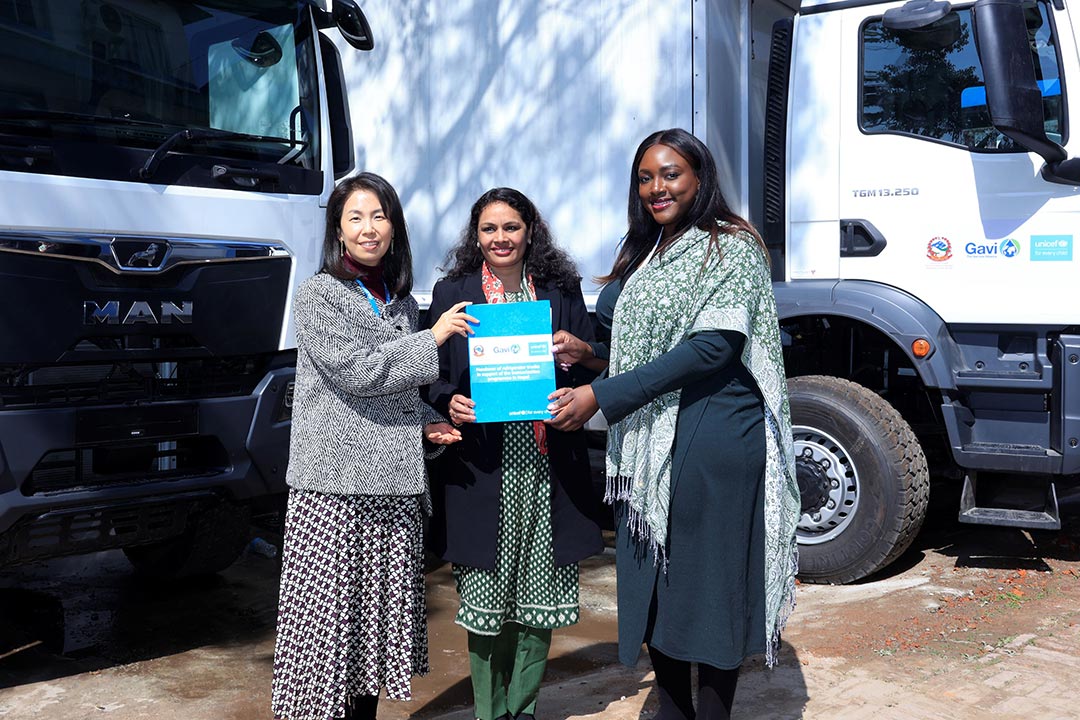
The trucks will support the government’s efforts to strengthen its immunisation programme through safe and timely delivery of vaccines across the country.
Kathmandu, Nepal, 19 February 2024 – UNICEF and Gavi, the Vaccine Alliance handed over four refrigerated trucks for vaccine transportation to the Government of Nepal’s Ministry of Health and Population in Kathmandu on Friday.
The refrigerated trucks will ensure safe delivery of essential vaccines from federal vaccine storage facilities to provincial and district vaccine stores. The delivery of these trucks is also timely, with the government’s upcoming measles and rubella (MR) “The Big Catch-up” vaccination campaign, which especially targets children who have not yet received any vaccines, also known as “zero-dose” children, and those who have not completed their doses as per the national vaccination schedule. The integrated campaign will also provide other vaccines children may have missed out on during the COVID-19 pandemic, such as pentavalent, inactivated polio vaccine (IPV), and pneumococcal conjugate vaccine (PCV).
Participating in the handover ceremony were Dr Sangeeta Kaushal Mishra, Director General, Department of Health Services; Ms Temidayo Ogunrinu, Senior Country Manager for Nepal, Gavi; Ms Jee Hyun Rah, UNICEF Deputy Representative, and other officials from the government, Gavi and UNICEF.
“I would like to express my gratitude to Gavi and UNICEF for this timely delivery of refrigerator trucks, which will definitely help in the upcoming MR campaign,” said Dr Mishra.
The trucks will assist the government in reaching zero-dose children, a population currently estimated at 4% according to the recent Nepal Demographic and Health Survey, Dr Mishra added.
Each truck is equipped with World Health Organization-approved refrigeration units with a 24 cubic metre storage capacity, capable of transporting nearly 4 million doses of MR vaccines. Using fewer trucks with larger capacity helps decrease carbon emissions compared to smaller, more frequent trips to all provinces of Nepal. UNICEF has allocated resources for the provision of these trucks, drawing from pooled funding made possible by supporters such as Gavi.
“I would like to congratulate the Government of Nepal for the multi-antigen catch-up approach for the upcoming measles-rubella campaign, which will also ensure children who may have missed other critical routine vaccinations during the [COVID-19] pandemic stay protected,” said Ms Ogunrinu. “Today’s delivery underscores the importance of investing in infrastructure and supply chain management, with vaccine transportation a key part of ensuring lifesaving vaccines stay at appropriate temperatures and can be effectively delivered to communities. Gavi is committed to supporting these efforts in collaboration with our Alliance partners, UNICEF and WHO.”
In addition to the provision of the trucks, UNICEF, with Gavi support, is collaborating with the government to strengthen various aspects of the national immunisation programme, including procurement of vaccines, improving cold chain systems and enhancing capacities for safe delivery of vaccines to communities. In collaboration with Gavi, UNICEF is also working with communities and local governments to identify zero-dose and under-immunised children, as well as barriers experienced by these children in accessing the vaccines.
“The current evidence suggests that there is an increase in zero-dose and under-immunised children in the country, and these interventions aimed at increasing vaccine coverage are of critical need in protecting children as well as other vulnerable populations from the risks of vaccine-preventable diseases,” said Ms Rah. “As we strive to enhance immunisation programme coverage in Nepal, we must ensure the delivery of quality vaccines and reach the ‘last mile’ of the population, for which the significance of a strong cold chain, active community engagement and robust behaviour change communication cannot be underestimated. UNICEF pledges its continued support in these efforts, to make sure that no child is left unimmunised in Nepal.”
MEDIA CONTACTS
Sharmina Manandhar, UNICEF Nepal
+977 9801007922
smanandhar@unicef.org
Eunice Kilonzo-Muraya, Gavi
+41 76 292 44 52
ekilonzo@gavi.org
Meg Sharafudeen, Gavi
+41 79 711 55 54
msharafudeen@gavi.org

